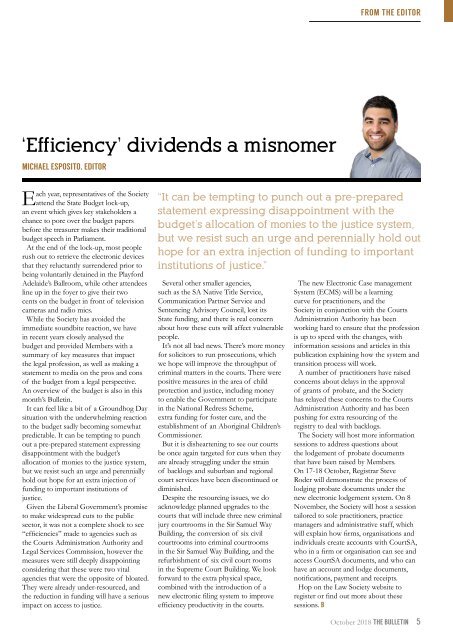LSB October 2018_Web
Create successful ePaper yourself
Turn your PDF publications into a flip-book with our unique Google optimized e-Paper software.
FROM THE EDITOR<br />
‘Efficiency’ dividends a misnomer<br />
MICHAEL ESPOSITO, EDITOR<br />
Each year, representatives of the Society<br />
attend the State Budget lock-up,<br />
an event which gives key stakeholders a<br />
chance to pore over the budget papers<br />
before the treasurer makes their traditional<br />
budget speech in Parliament.<br />
At the end of the lock-up, most people<br />
rush out to retrieve the electronic devices<br />
that they reluctantly surrendered prior to<br />
being voluntarily detained in the Playford<br />
Adelaide’s Ballroom, while other attendees<br />
line up in the foyer to give their two<br />
cents on the budget in front of television<br />
cameras and radio mics.<br />
While the Society has avoided the<br />
immediate soundbite reaction, we have<br />
in recent years closely analysed the<br />
budget and provided Members with a<br />
summary of key measures that impact<br />
the legal profession, as well as making a<br />
statement to media on the pros and cons<br />
of the budget from a legal perspective.<br />
An overview of the budget is also in this<br />
month’s Bulletin.<br />
It can feel like a bit of a Groundhog Day<br />
situation with the underwhelming reaction<br />
to the budget sadly becoming somewhat<br />
predictable. It can be tempting to punch<br />
out a pre-prepared statement expressing<br />
disappointment with the budget’s<br />
allocation of monies to the justice system,<br />
but we resist such an urge and perennially<br />
hold out hope for an extra injection of<br />
funding to important institutions of<br />
justice.<br />
Given the Liberal Government’s promise<br />
to make widespread cuts to the public<br />
sector, it was not a complete shock to see<br />
“efficiencies” made to agencies such as<br />
the Courts Administration Authority and<br />
Legal Services Commission, however the<br />
measures were still deeply disappointing<br />
considering that these were two vital<br />
agencies that were the opposite of bloated.<br />
They were already under-resourced, and<br />
the reduction in funding will have a serious<br />
impact on access to justice.<br />
“It can be tempting to punch out a pre-prepared<br />
statement expressing disappointment with the<br />
budget’s allocation of monies to the justice system,<br />
but we resist such an urge and perennially hold out<br />
hope for an extra injection of funding to important<br />
institutions of justice.”<br />
Several other smaller agencies,<br />
such as the SA Native Title Service,<br />
Communication Partner Service and<br />
Sentencing Advisory Council, lost its<br />
State funding, and there is real concern<br />
about how these cuts will affect vulnerable<br />
people.<br />
It’s not all bad news. There’s more money<br />
for solicitors to run prosecutions, which<br />
we hope will improve the throughput of<br />
criminal matters in the courts. There were<br />
positive measures in the area of child<br />
protection and justice, including money<br />
to enable the Government to participate<br />
in the National Redress Scheme,<br />
extra funding for foster care, and the<br />
establishment of an Aboriginal Children’s<br />
Commissioner.<br />
But it is disheartening to see our courts<br />
be once again targeted for cuts when they<br />
are already struggling under the strain<br />
of backlogs and suburban and regional<br />
court services have been discontinued or<br />
diminished.<br />
Despite the resourcing issues, we do<br />
acknowledge planned upgrades to the<br />
courts that will include three new criminal<br />
jury courtrooms in the Sir Samuel Way<br />
Building, the conversion of six civil<br />
courtrooms into criminal courtrooms<br />
in the Sir Samuel Way Building, and the<br />
refurbishment of six civil court rooms<br />
in the Supreme Court Building. We look<br />
forward to the extra physical space,<br />
combined with the introduction of a<br />
new electronic filing system to improve<br />
efficiency productivity in the courts.<br />
The new Electronic Case management<br />
System (ECMS) will be a learning<br />
curve for practitioners, and the<br />
Society in conjunction with the Courts<br />
Administration Authority has been<br />
working hard to ensure that the profession<br />
is up to speed with the changes, with<br />
information sessions and articles in this<br />
publication explaining how the system and<br />
transition process will work.<br />
A number of practitioners have raised<br />
concerns about delays in the approval<br />
of grants of probate, and the Society<br />
has relayed these concerns to the Courts<br />
Administration Authority and has been<br />
pushing for extra resourcing of the<br />
registry to deal with backlogs.<br />
The Society will host more information<br />
sessions to address questions about<br />
the lodgement of probate documents<br />
that have been raised by Members.<br />
On 17-18 <strong>October</strong>, Registrar Steve<br />
Roder will demonstrate the process of<br />
lodging probate documents under the<br />
new electronic lodgement system. On 8<br />
November, the Society will host a session<br />
tailored to sole practitioners, practice<br />
managers and administrative staff, which<br />
will explain how firms, organisations and<br />
individuals create accounts with CourtSA,<br />
who in a firm or organisation can see and<br />
access CourtSA documents, and who can<br />
have an account and lodge documents,<br />
notifications, payment and receipts.<br />
Hop on the Law Society website to<br />
register or find out more about these<br />
sessions. B<br />
<strong>October</strong> <strong>2018</strong> THE BULLETIN<br />
5


















